BIS Certification for Laboratory Equipments as per IS 878:2008, IS 915:2012, IS 1381 (PART 1):2003, IS 1117:2018 AND IS 2619:2018
In the realm of scientific research and experimentation, laboratory glassware plays a pivotal role. Whether you are conducting chemical analysis, titration, or precise measurements, the quality of your glassware can greatly impact the accuracy and reliability of your results. To ensure that laboratory glassware meets stringent quality standards, the Bureau of Indian Standards (BIS) has established a certification process for various types of laboratory glassware, including graduated measuring cylinders, one-mark volumetric flasks, narrow-necked boiling flasks, single volume pipettes, and glass beakers. In this article, we will delve into the significance of BIS certification for laboratory glassware, focusing on five essential categories mentioned above, and also explore how Omega QMS Pvt Ltd can assist you in obtaining BIS certification.
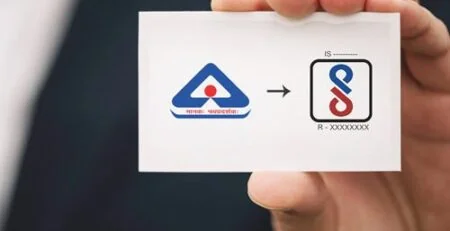
IS 878:2008 GRADUATED MEASURING CYLINDERS
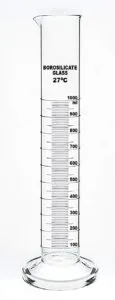
IS 915:2012 ONE-MARK VOLUMETRIC FLASKS
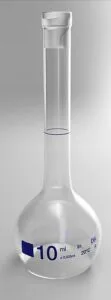
IS 1381 (PART 1):2003 NARROW-NECKED BOILING FLASKS
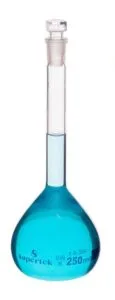
IS 1117:2018 SINGLE VOLUME PIPETTES
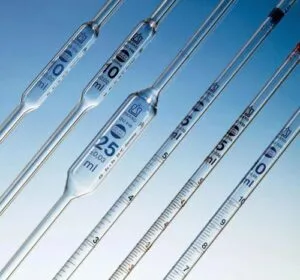
IS 2619:2018 GLASS BEAKERS
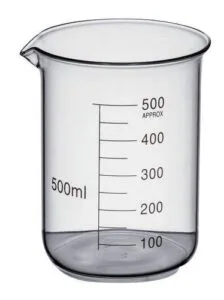
QUALITY CONTROL ORDER (TECHNICAL REGULATION) ISSUED BY THE DEPARTMENT FOR PROMOTION OF INDUSTRY AND INTERNAL TRADE, MINISTRY OF COMMERCE AND INDUSTRY, GOVT. OF INDIA ON 01 JANUARY 2024 FOR MANDATORY BIS CERTIFICATION
The DPIIT, Ministry of Commerce & Industry, Govt. of India, has issued an order, making it mandatory for all laboratory glassware to be used in India, whether manufactured in India or imported from foreign countries, shall mandatorily carry the Standard Mark of the Bureau of Indian Standards under a valid BIS licence. In short, it has become obligatory for all the manufacturers of laboratory glassware, whether in India or overseas, to immediately apply for BIS licence and obtain a valid BIS certification licence before that the last date of implementation of the order, i.e., 30 June 2024.
BIS CERTIFICATION SCHEME
The BIS Standards listed above establish a comprehensive framework encompassing various quality parameters that laboratory glassware must adhere to. The Bureau of Indian Standards Certification Scheme is a vital framework established by the Indian government to ensure the quality, safety, and reliability of products available in the market. This scheme aims to safeguard consumer interests by setting stringent benchmarks and guidelines that products must meet before they can be deemed compliant. BIS certification covers a wide range of industries and products, encompassing the entire gamut of industrial and manufacturing activity. Various steps involved in the BIS Certification process are enumerated below:
- Standard Identification: Manufacturers identify the relevant BIS standard that applies to their chosen product category. These standards outline the specific quality, safety, and performance requirements that the product must meet.
- Application Submission: Manufacturers submit an application for BIS certification to the Bureau of Indian Standards (BIS), providing details about the product, its specifications, and the desired certification mark.
- Factory Inspection: BIS conducts an inspection of the manufacturer’s production facility to assess the quality control processes, infrastructure, and adherence to relevant standards.
- Sample Testing: BIS collects samples of the product from the manufacturer for testing in authorized BIS laboratories or recognized testing centers. These tests evaluate various parameters specified by the BIS standard.
- Certification Decision: Based on the satisfactory test results and compliance with standards, BIS decides whether to grant certification to the product. If approved, the manufacturer is issued a BIS certification license.
- Regular Monitoring: BIS monitors the manufacturing process of certified products through periodic audits and market surveillance to ensure ongoing compliance with quality control processes and standards.
OMEGA QMS PVT. LTD. – PARTNERING FOR SUCCESS
In the pursuit of achieving BIS certification and maintaining the highest levels of product quality, Omega QMS Pvt. Ltd. emerges as an invaluable partner for manufacturers. Backed by a global presence and a stellar track record of successful collaborations with Fortune 500 companies, Omega QMS provides an extensive array of services designed to streamline the certification process and ensure compliance with industry standards.
- Expert Guidance: Omega brings together a team of seasoned experts who possess in-depth knowledge of regulatory requirements, industry best practices, and intricacies of certification process. These experts guide manufacturers through the complex landscape, offering insights and strategies to navigate the process efficiently.
- Testing and Validation: Omega assists manufacturers in planning and executing necessary tests and validations required for BIS certification.
- Documentation and Compliance: The journey toward BIS certification demands meticulous documentation of processes, materials, and testing procedures. Omega aids manufacturers in creating comprehensive and accurate documentation that aligns with BIS requirements, reducing the risk of errors and rejections.
- Audit Support: Omega prepares manufacturers for BIS audits, which are a crucial part of the certification process. With its expertise, the organization ensures that manufacturers are well-prepared for audits, addressing any issues that may arise and increasing the likelihood of a successful outcome.
- Customized Approach: Each manufacturer’s journey toward BIS certification is unique. Omega understands this and tailors its services to fit the specific needs, challenges, and goals of individual manufacturers, ensuring a personalized and effective approach.
- Global Experience: With presence in over 40 countries, Omega brings global experience to the table. This international exposure allows the organization to offer insights into varying regulatory environments and industry practices, enabling manufacturers to excel globally.
Omega QMS Pvt. Ltd. functions as a strategic partner for manufacturers aiming to achieve BIS Certification. Its multifaceted approach encompasses expert guidance, process control, testing and validation support, documentation assistance, audit preparation, training, and a global perspective. By collaborating with Omega, manufacturers gain a competitive edge in their pursuit of certification while upholding the highest standards of product quality and consumer satisfaction.
For more details you can reach out to Omega at info@globalomega.com.
BIS certification for laboratory glassware is not merely a regulatory requirement but a testament to the quality, precision, and reliability of these essential tools in scientific research and experimentation. Whether you are a research institution, educational facility, or industry involved in scientific endeavors, BIS certification ensures that your laboratory glassware meets the stringent quality criteria set by the Bureau of Indian Standards. Partnering with Omega QMS Pvt Ltd can simplify the process of obtaining BIS certification for laboratory glassware. Their expertise, guidance, quality assessment, and documentation support can streamline the certification process, allowing you to focus on your research and experiments with confidence in the quality of your glassware. In the world of science, precision matters, and BIS certification is your assurance of accuracy and reliability.
